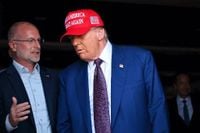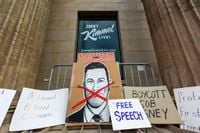The world of late-night television has always been a battleground for political satire and free speech, but rarely has the clash felt as raw and consequential as in the wake of Jimmy Kimmel’s abrupt removal from the airwaves. In mid-September 2025, ABC indefinitely suspended "Jimmy Kimmel Live!" following Kimmel’s pointed remarks about the shooting of conservative activist Charlie Kirk—a move that has sent shockwaves through Hollywood, the media industry, and political circles alike.
On September 10, Kimmel addressed the tragic killing of Kirk during his monologue, criticizing what he described as the "MAGA gang" for attempting to frame the shooter as anything but one of their own. He accused Trump supporters of politicizing the event, a comment that, by week’s end, would ignite a firestorm reaching far beyond the studio lights. The fallout was swift: ABC pulled the show, citing concerns over the monologue, but the story behind the scenes proved to be far more complex and troubling.
According to Poynter, the catalyst for ABC’s decision wasn’t solely Kimmel’s on-air comments. FCC Chair Brendan Carr, appearing on a conservative podcast on September 18, called for action against Kimmel, ominously warning, “Look, we can do this the easy way or the hard way. These companies can find ways to change conduct, to take action, frankly, on Kimmel or, you know, there’s going to be additional work for the FCC ahead.” Within hours, Nexstar Media Group—which owns ABC affiliates in 32 markets—announced it was pulling Kimmel’s show “indefinitely.” ABC followed suit, making the suspension official.
Carr later praised the move, citing the responsibility of broadcasters to operate in the public interest and uphold local community values. Yet, as Poynter and The New York Times noted, Carr’s stance marked a sharp departure from his previous public defenses of free speech. In 2019, Carr tweeted, “Should the government censor speech it doesn’t like? Of course not. The FCC does not have a roving mandate to police speech in the name of the ‘public interest.’” As recently as 2023, he declared, “Free speech is the counterweight—it is the check on government control. That’s why censorship is the authoritarian’s dream.”
The apparent hypocrisy did not go unnoticed. The American Civil Liberties Union’s Christopher Anders called the administration’s actions “beyond McCarthyism,” arguing, “Trump officials are repeatedly abusing their power to stop ideas they don’t like, deciding who can speak, write, and even joke. The Trump administration’s actions, paired with ABC’s capitulation, represent a grave threat to our First Amendment freedoms.” Illinois Governor JB Pritzker echoed these concerns, warning, “This is the playbook, folks. If you’re not paying attention now and doing something about it, then you’re going to have to sit down the rest of your life because democracy is being taken away. Do not be quiet in this moment.”
Hollywood, never shy about defending its own, erupted in support of Kimmel. Ben Stiller summed up the mood with a terse post: “This isn’t right.” Wanda Sykes, who was scheduled to appear on Kimmel’s show, posted a video criticizing the Trump administration, stating, “As you have heard by now, the Jimmy Kimmel show has been pulled indefinitely, abruptly, because of complaints from the Trump administration.” She accused Trump of ending freedom of speech within his first year in office and closed with a heartfelt, “Love you, Jimmy.”
David Letterman, a legend of late-night television, spoke candidly at The Atlantic Festival in New York, calling the suspension “misery” and “ridiculous.” He reflected on his own career, recalling, “In the name of comedy, not once were we squeezed by anyone from any governmental agency, let alone the dreaded FCC, Republican or Democrat. Never.” Letterman suggested the cancellation may have been premeditated, noting, “Kimmel’s removal from late-night TV was predicted by our president right after Stephen Colbert got walked off.”
Screenwriter Damon Lindelof, a former ABC collaborator, expressed his outrage on Instagram, vowing not to work with Disney if the suspension wasn’t reversed. “If you’re about to fire up in my comments, just ask yourself if you know the difference between hate speech and a joke. I think you still do. And Jimmy? You’ve ALWAYS known what you were doing. Love you and support you.”
Other celebrities, including Jean Smart, Sophia Bush, Christie Brinkley, Rosie O’Donnell, and Adam Carolla, condemned the network’s decision as an attack on free speech. Jean Smart declared, “What Jimmy said was FREE speech, not hate speech. People seem to only want to protect free speech when it suits THEIR agenda.” Kathy Griffin urged fans to “be vocal” and support Kimmel, while Sophia Bush lamented, “The First Amendment doesn’t exist in America anymore. Fascism is here and it’s chilling.”
Behind the scenes, business and political interests appeared to be deeply entwined. The Washington Post and CNN highlighted that Nexstar’s pending acquisition of Tegna and Disney’s bid for Fubo both required FCC approval, raising questions about whether media companies were bowing to government pressure to protect lucrative deals. Dan Le Batard, a prominent sports media figure, lambasted Disney CEO Bob Iger for not defending Kimmel, saying, “Once you’re a coward who’s extorted, the bully is going to keep extorting the coward.”
Former President Trump’s fingerprints were evident throughout the saga. After CBS canceled Stephen Colbert’s show earlier in the summer, Trump posted on social media, “I hear Jimmy Kimmel is next. Has even less talent than Colbert!” When Kimmel was suspended, Trump claimed it was due to poor ratings, though neither Nexstar nor ABC cited ratings as a reason for the sudden move. Instead, critics argued that the real motivation was silencing a vocal critic of the administration.
Not all reactions were supportive. ESPN’s Stephen A. Smith, on his SiriusXM show, questioned the comedic value of Kimmel’s remarks, asking, “Where was the joke? Obviously, there wasn’t anything funny about that.” Yet Smith’s comments were seen by many as missing the broader point about free speech and political pressure.
As of Thursday night, Kimmel himself had not commented publicly on his show’s removal. While ABC has not declared the show permanently canceled, industry insiders and observers doubt it will return. The dilemma for Kimmel is stark: apologize and potentially compromise his principles, or stand firm and risk his career—and the livelihoods of his staff. Either choice underscores the chilling effect that political pressure can have on American media.
For now, the fate of "Jimmy Kimmel Live!" hangs in the balance, but the larger battle over free speech, political influence, and the future of late-night television is only intensifying. The story serves as a stark reminder that the line between entertainment and politics is thinner than ever—and that the stakes for democracy and open discourse are anything but trivial.


